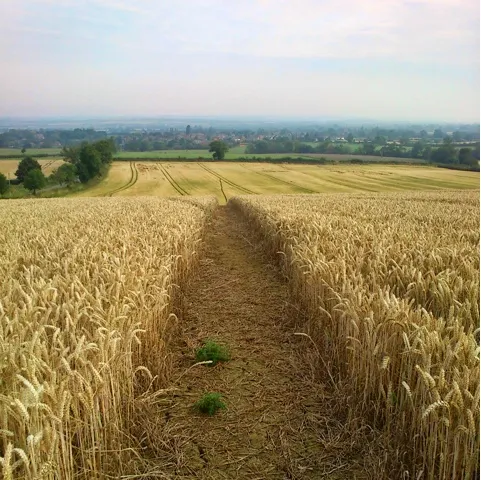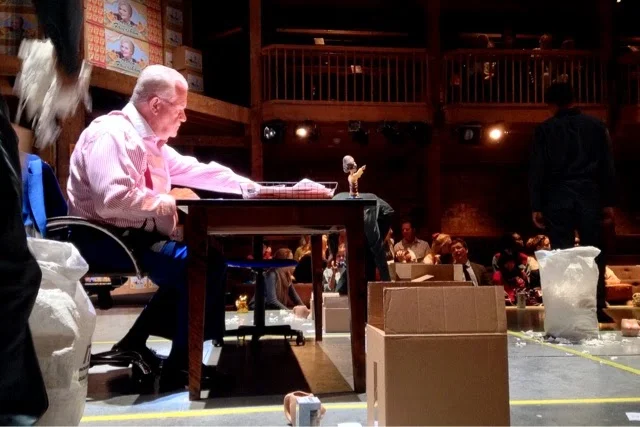As I read more and more of Kathleen Ashby’s wonderfully detailed
book – and wish that she had stayed in Tysoe, and carried out her thorough research and narration here… – it becomes obvious that certain themes echo down the centuries: some even remaining – or re-emerging – as contemporary issues. (To paraphrase
Douglas Adams: For a few hundred years, nothing changed. Then, after a few centuries or so, nothing continued to change.)
One of the principal themes – Bledington, as Tysoe, being a rural economy – is, of course, land ownership (and the
greed that can result); the continuing (if not growing) difference between those who have, and those who have not; and the
attitudes of the richer classes to the poorer (never made quite so blunt, perhaps, as in the bearing and behaviour of the current, élitist, Tory-led government – and its continuing mission to boldly rid the poverty-stricken, zero-hour contracted, disabled, and unemployed of all their dignity…).
I know my place. I look up to them…; but while I am poor, I am honest, industrious and trustworthy. Had I the inclination, I could look down on them. But I don’t.
One of the earliest references to this concerns the fourteenth-century, Malvern-born poet,
William Langland – most famous for the beautiful and dreamy poem
Piers Plowman – and his “passionate concern for the well-being of ordinary folk”:
All around him, Langland sees superstition, greed and riches, together with poverty unrelieved. Pope, priests, bishops, have all failed the people. Greed is the basic cause of evil, affecting not only the great folk, but merchants and tradesmen, and in even greater degree lawyers, those flatterers and sycophants. Langland says clearly what he means by greed. He contrasts “measureless meed” with “measureable hire”. Here is more than a Marxian touch. The longing for unearned increment is in all men; ‘capitalism’ is only one of its results….
“The poor have no power to complain though they smart” but “Ye macemen and mayors that are midmost and mean The King and the Commons have power.”
Langland does not look to rural knights or to the lords of lands for help. In this, and in looking to the towns, he is prophetic. The nineteenth century saw terrible need for help and saw the towns indirectly give it.
¶
Later, when Kathleen Ashby moves on to the sixteenth century, she discusses how…
The great struggles and developments of this period would continue and remain recognisably continuous through more than three hundred years, until the First World War in 1914. Villages would undergo changes apparently revolutionary, but never so thorough that many old patterns ceased to throw up problems, at least one of these, the relief of the poor, growing more acute and tragic for centuries and until 1918, never solved.
I think – as a social historian, very much in touch with the plight of those struggling to find meaning with and through their lives – Kathleen (especially given her
heritage) would be heartbroken to see that we have, in the intervening century, regressed so terribly: with anyone who is different – because of unemployment, status, race, infirmity, etc. – being treated so badly, again, by those influencing – and letting themselves be influenced by – the modern press.
For a long time past the problem of poverty had grown more acute and more pervasive…. During the sixteenth century there were added to ‘God’s poor’ (the aged, the blind, the lame, the widow and the orphan) great numbers of destitute persons who were young and even, when not starved of food, able-bodied.
Will historians of the twenty-first century document
us in the same way: with benefits sanctions and other measures forcing the ‘hardworking’ featured in political
slogan-making to rely on food-banks and other charitable enterprises as leading examples of our belief in unattainable (but capital-led) supposed equality? What about our scurrying to spend increasing portions of our (hard-earned) salaries on property ownership?
In the course of the seventeenth century there came to be a score of freeholders. The husbandmen in their wish to be owners learned to borrow money: here begins the career of that potent and dangerous document… – the mortgage.
At the same time – eerily echoing the news stories and concerns of today – the numbers of labourers and the poor were increasing:
Some became casual workers, and vagrants and then destitute. This was an old problem. Henry VIII’s government had tackled it with some success, providing a parochial machinery and stimulating charity. Elizabeth and her Parliament had passed experimental legislation and checked its results…. But after the coming of James I these practices were discontinued and during the struggle between throne and Parliament the poor were left to parish officers.
The Restoration brought no return of systematic thought or planning…. Those who could have spoken for the poor were silenced and depressed; the idea of allowing or encouraging the poor to speak of their own condition was totally absent. On the contrary, under the dominance of the wealthy landowners who, now, in Boswell’s term “possessed” Parliament, and of industrial entrepreneurs and merchants there grew up an attitude to the poor of unheard of brutality and insolence whose development and spread would continue through the next century…
…and still be present today.
The move to enclosure, and private farming, and the concomitant removal of common land, also did nothing to help those at the bottom levels of rural society:
Arthur Young, the first great agricultural reporter was a propagandist for enclosure in his early writings and would later sum up the stimulating quality of outright possession in the well-known phrases “the magic of property turns sand into gold” and “the enjoyment of property… has clothed the very rocks with verdure”.
Beside the satisfaction of gain in produce or money, there were the more imaginative pleasures of ownership and mastery – of being lord of what one surveys and being able to say to one “Go!” and to another “Come!” and perhaps to a third “Vote!” Plainly, profit of this order helped to bring about… enclosure….
Sometimes it is said that the growth of the population of the country led to enclosures, but they were not advocated as a means of feeding the people: the absence of this motive is shown in the general absence of the wish to feed adequately even workers on the land.
There was in fact no adequate debate on the gains and losses from enclosures: exposition was one-sided. Enclosure would change the basis of thousands of communities but this fact was not to the front… landownership and therefore the management of land as property, rather than as soil for crops, was the ruling factor in English life….
The results of the enclosure were not in the economic sphere momentous: there was never emphasis on mere exploitation until the twentieth century. But the system which had come to an end was communal.
This dissolution of community – echoing my
plea to the Planning Inspectorate re “the threats the cohesion of this community faces” – may be why we look at Mr White’s field of ridge-and-furrow, between Tysoe Manor and Oxhill Road, and see more than just lumps and bumps of earth. In our veins we understand implicitly what we have already lost; as well as seeing, explicitly, with our brains engaged, the need to preserve this co-operative relic from a long-lost time – the history and
nostalgia that can be used in the game of planning poker we play against the likes of Gladman.
¶
As some of us now fight for living wages, so, in the eighteenth century, the obverse: “Maximum wages were controlled by the landlord-magistrates, but not the minimum.” Only as the eighteenth century rolled into the nineteenth would Samuel Whitbread, “the rich brewer and humane man and statesman”, introduce a bill to the House of Commons “to end the fixing of a maximum wage and to institute minimum pay”.
The easiest way to reduce costs of production was by the lowering of wages and increase of hours…. Even the humane Arthur Young wrote that “Everyone knows that the lower classes must be kept poor or they will never be industrious… they must (like all mankind) be in poverty or they will not work.”
It would not surprise me if Iain Duncan Smith recites this eagerly, every night, before retiring to bed: where, no doubt, he sleeps easily in his cruel, simplistic beliefs.
Other doctrines, however, did allow the poor to have, at least, souls. With the growth of Methodism in the eighteenth century, and the outpourings of John Wesley, one day his movement “would assist the widespread revolt against evil conditions of living”.
“Want of tenderness,” Dr. Johnson said, “was want of parts and no less a proof of stupidity than depravity,” but England would require most of the nineteenth century to learn the truth of that.
¶
As hinted above, single mothers – as now – came in for particular criticism, as if they had made themselves poor on purpose:
Some have thought that the expectation of an allowance for each child from the parish, influenced unmarried mothers – a reasonable view in some cases but not here a necessary one and false in some parishes, e.g. Tysoe.
Here, Kathleen invokes the deep knowledge her father had of our village, our community; and it is easy to see obvious parallels ploughed between her adopted home of Bledington, and the village where she was raised; as well as between the past and the present.
One passage in particular raised my ire, though, with its modern equivalency in the “
deep dark hell” of jobcentres – particularly for
those suffering with mental illnesses:
The young and the lame went where their infirmities and capacities were not understood…. In many parishes when work was lacking overseers refused relief unless the men performed some set useless tasks or even actions that did not pretend to be work [including men being] set to lower the height of ridges in the fields by throwing soil into the furrows with spades; they might as well have been set [Sisyphus’] task of rolling a great stone up a hill.
I don’t believe all humans to be evil (although we all contain that seed…); but I do suspect that our tendency to selfishness, and the increasing mania for consumption, along with a parallel wish for ease and speed of delivery – of both goods and information (the received opinion seeming particularly popular – even though we have never had so much data readily within reach…) – have contributed to our continuing disdain for, and ill-treatment of, “anyone who is different” (especially those who we perceive to be beneath us): and particularly those who have less than we do.
These people frighten us, because they are an unknown quantity; but they are also easy to ignore, or, even worse, mistreat, because of their lack of similarity to us, to what we know and understand.














